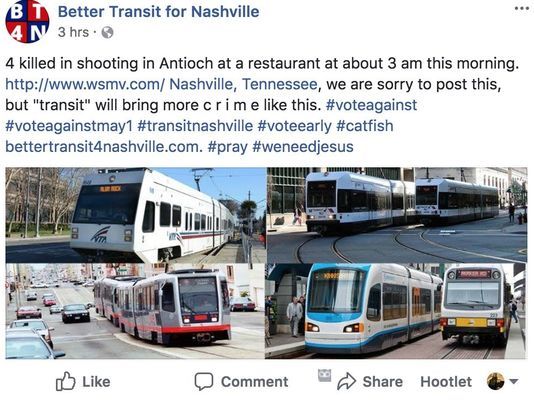The Koch brothers are at it again in Nashville.
Three years after funding a campaign to sink the city's high-profile BRT project, the world's richest climate deniers are paying their minions to wage a vicious fight against Nashville's potentially transformative $5 billion transit referendum.
Transit policy experts view the package of bus and light rail improvements as a breakthrough that will deliver on its promise to create service people will want to use. On May 1, voters will decide whether to proceed with expanded bus service, new light rail and bus rapid transit routes, and pedestrian safety improvements, to be funded mainly by a sales tax bump.
As the election draws near, Koch-backed Americans for Prosperity Tennessee and a swarm of opposition groups funded by dark money have mounted a vicious disinformation campaign to prevent the proposal from passing, undermining years of public consensus building.
A single group, "NoTax4Tracks," raised about $950,000 in three months to fight the transit package, reports the Tennessean. Most of it -- $750,000 -- was from a separate dark money organization whose donors are secret.
Meanwhile, the Koch-backed Americans for Prosperity has been phone banking, sending opposition mailers, and organizing against the transit referendum.
The closer the election gets, the dirtier the tricks.
One of the transit opposition groups goes by the confusing name "Better Transit for Nashville." The Tennessean recently published an op-ed submitted by the group, but was forced to print an apology after it was revealed that the byline was fake.
In another display of absolute shamelessness, the same group posted on Facebook that approving the transit referendum would "bring crime" like the Waffle House shooting, in which four people of color were killed by a 29-year-old white man with an AR-15. According to the Tennessean, the shooter arrived by truck.
Nora Kern, director of Bike Walk Nashville, which is one of 130 groups backing the referendum, says the debate has definitely taken an ugly turn in the last few weeks.
"The transit for Nashville side is trying to explain a really complicated infrastructure referendum," she said. "The opposition just needs to make people confused or scared and they win."
But Kern thinks the optimistic message from the pro-transit coalition can carry the day. Supporters expect the vote to be close and the outcome to come down to turnout.
"Our city desperately needs transportation options," she said. "If you don’t have a car in Nashville you’re a second-class citizen. The only way we’re really going to move our city forward is to have dedicated funding for transit and walking. This is our city’s opportunity."






